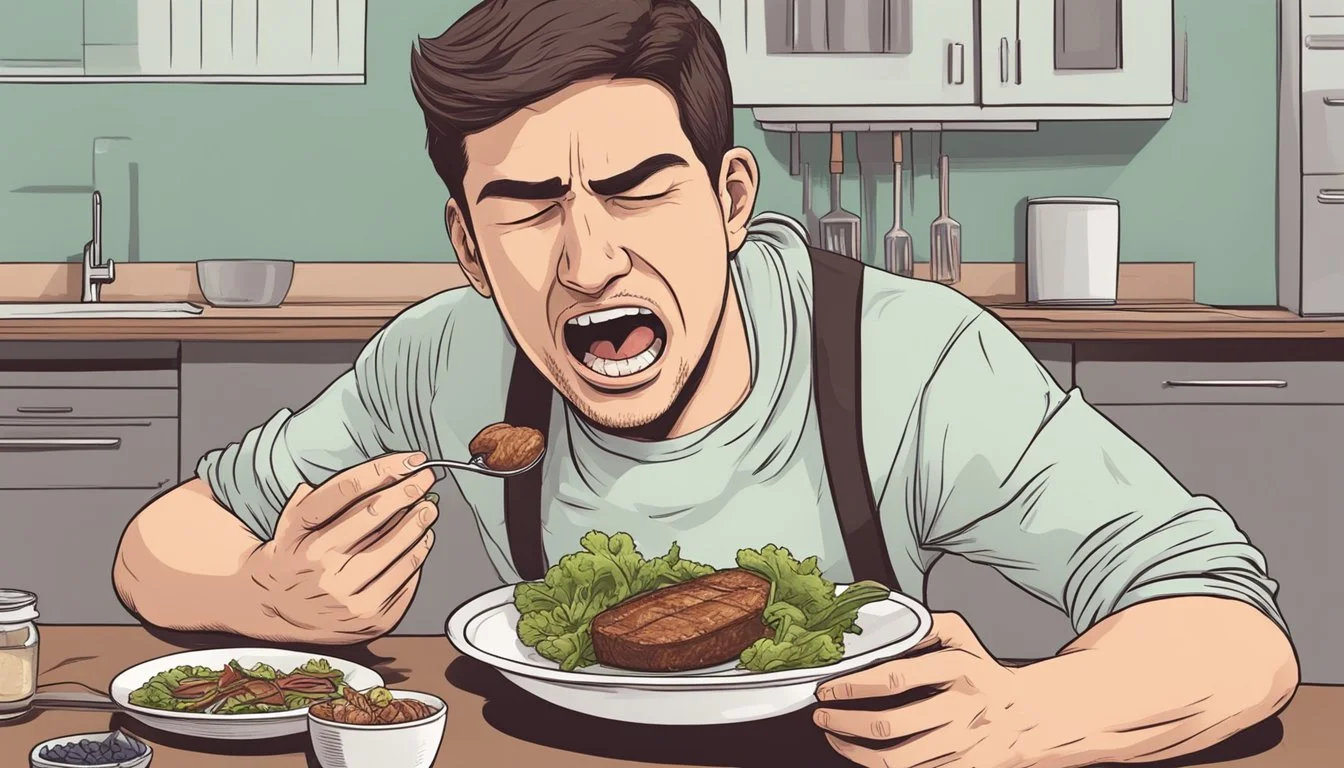Hemorrhoids Carnivore Diet
Examining the Impact on Digestive Health
Hemorrhoids, a common and sometimes painful condition, have various triggers, including dietary choices. A shift in eating habits such as adopting the carnivore diet, which focuses exclusively on animal products and eliminates other food groups, can have significant effects on digestive health. The carnivore diet has its proponents who argue for various health benefits, including increased energy levels, but its restrictive nature raises questions about its impact on digestive issues like hemorrhoids.
The carnivore diet is often low in dietary fiber since it excludes plant-based foods, which are the primary sources of both soluble and insoluble fiber. This lack of fiber can lead to constipation, a known risk factor for the development or exacerbation of hemorrhoids. Adequate fiber intake is recognized for its role in maintaining healthy bowel movements, which is crucial in the management and prevention of hemorrhoids. Those considering or already on a carnivore diet need to be aware of this potential risk and the importance of bowel health in relation to hemorrhoids.
Understanding Hemorrhoids
Hemorrhoids are a common condition where swelling and inflammation occur in the veins around the anus and lower rectum. This section explores the symptoms and causes, the different types, potential complications, and the influence of diet on their management.
Symptoms and Causes
Hemorrhoids manifest through symptoms such as pain, bleeding, itching, and pressure in the anal area. They primarily arise from straining during bowel movements, prolonged constipation, and excessive pressure on the veins due to pregnancy or obesity. A diet low in fiber can contribute to constipation and subsequently to the development of hemorrhoids by making stools hard and more difficult to pass.
Types of Hemorrhoids
Hemorrhoids are classified into two types:
Internal Hemorrhoids: Located inside the rectum and are typically painless, with bleeding being the main symptom.
External Hemorrhoids: Found under the skin around the anus, these can be uncomfortable and painful, and might clot under the skin to form a hard lump.
Complications of Hemorrhoids
If left untreated, hemorrhoids can lead to complications such as:
Thrombosis: The development of a painful clot.
Prolapse: When an internal hemorrhoid protrudes outside the anus and can cause significant pain and discomfort. Chronic blood loss from hemorrhoids can also lead to anemia.
Role of Diet in Hemorrhoid Management
Diet plays a crucial role in both the prevention and management of hemorrhoids. A diet rich in fiber can alleviate constipation and reduce the strain during bowel movements. Adequate fluid intake is equally important, as it helps to maintain stool softness and regularity. Nutrients that support vascular health might also be beneficial for hemorrhoid relief and avoidance of further inflammation.
Carnivore Diet Overview
The Carnivore Diet is a regimen focused on animal products, with reported implications for overall health, digestion, and nutrient intake. This section reveals the diet's core principles, health effects, digestive impact, and nutritional content.
Fundamentals of the Carnivore Diet
The Carnivore Diet is characterized by the exclusive consumption of animal products—meat, organ meats, eggs, and some dairy products like cheese. It eliminates all plant-based foods, positioning itself as an elimination diet that focuses on protein and fats derived from animals. Red meat such as beef, along with pork, chicken, fish, and organ meats such as kidney, heart, and liver, form the diet’s cornerstone.
Potential Health Impacts
Participants have reported changes in weight and mental health, although individual experiences vary. High intake of animal fats and proteins may influence cholesterol levels, and since the diet is almost devoid of carbohydrates, it can affect the body’s typical fuel sources. However, potential impacts on the immune system due to the lack of certain nutrients found in plants should be considered.
Carnivore Diet and Digestion
Digestion on the Carnivore Diet can be significantly altered. A strict carnivorous diet can lead to changes in bowel movements, with individuals sometimes experiencing constipation or diarrhea. The absence of fiber may affect stool consistency and frequency. Some individuals report an initial adjustment period followed by normalization, while others continue to experience digestive challenges which could potentially exacerbate conditions such as hemorrhoids.
Nutritional Considerations
Nutrient density is a concern with this diet, as it provides high levels of protein and fat but may lack essential nutrients found in plant foods. Vitamin and mineral intake, particularly sodium and certain fats, is typically high, but followers may risk deficiencies in vitamins C and E, fiber, and potentially other micronutrients. Therefore, individuals should ensure they consume a variety of animal products to cover as broad a range of nutrients as possible.
Get the best value for your money by purchasing vitamin C, vitamin E, and fiber supplement online!
Hemorrhoids and the Carnivore Diet
The carnivore diet's impact on hemorrhoids is multifaceted, affecting symptoms and digestive health. Individuals with hemorrhoids considering this diet should be aware of potential challenges and the importance of dietary balance for maintaining rectal health.
Impact on Hemorrhoid Symptoms
The carnivore diet, which eliminates plant-based foods, has been reported by some individuals to affect symptoms of hemorrhoids, such as pain, bleeding, and inflammation. The absence of fiber-rich foods could lead to constipation, increasing the strain during bowel movements and potentially exacerbating hemorrhoid symptoms. However, others have noted improvement in these symptoms, possibly due to reduced irritation from the elimination of certain plant-based foods.
Pain and Pressure: Relief may vary based on how the diet influences bowel movement frequency and stool consistency.
Bleeding and Itching: Some might experience a decrease in bleeding and itching if the diet reduces gastrointestinal inflammation.
Digestive Challenges
A diet exclusively based on meat and animal products typically lacks both soluble fiber and insoluble fiber, essential for stool bulk and bowel regularity. This lack can lead to:
Constipation: Struggling with bowel movements may increase hemorrhoid discomfort.
Stool Softness: Without dietary fiber, stools may be harder and exacerbate hemorrhoid-related pain.
Risks and Precautions
Individuals on a carnivore diet may face several risks, especially if they have hemorrhoids:
Increased Straining: Due to constipation, there may be more strain during bowel movements, risking further hemorrhoid aggravation.
Long-term Health Problems: Limiting the diet to meat could lead to nutritional deficiencies that affect overall health.
Precautions should include:
Monitor Symptoms: Keep a close eye on hemorrhoid symptoms and adjust the diet as necessary.
Dietary Changes: Consider gradual dietary changes rather than abrupt ones to avoid digestive shock.
Dietary Alternatives and Supplements
To support hemorrhoidal health on a carnivore diet, individuals may seek to incorporate dietary alternatives or supplements:
Fiber Supplementation: If plant foods are avoided, a soluble fiber supplement might help to soften stools and reduce constipation.
Inclusion of Fiber-rich Foods: Gradually including some fiber-rich foods or opting for a more balanced diet like keto before transitioning to full carnivore could ameliorate digestive symptoms.
Consultation with a Health Professional: Personalized advice on diet-related risks and potential need for surgery can provide targeted relief based on individual health needs.
Daily Diet Recommendations
In the management of hemorrhoids, it's crucial for individuals to focus on a diet that supports bowel health. Here are specific dietary recommendations to consider:
Incorporating Fiber-Rich Foods
Dietary fiber is essential in preventing constipation, a common irritant for hemorrhoids. Fiber-rich foods help to soften stool and increase its bulk, which can reduce the strain during bowel movements. Individuals should aim for:
Vegetables: such as broccoli, carrots, and Brussels sprouts.
Fruits: including apples, pears, and berries.
Grains: opting for whole grains like oatmeal and brown rice.
Beans: all varieties contribute to your daily fiber intake.
Nuts and Seeds: such as almonds, flaxseeds, and chia seeds.
Hydration and Fluid Intake
Adequate hydration plays a vital role in preventing hard stools. Individuals should drink plenty of water and other fluids throughout the day:
At least 8-10 glasses of water daily.
Minimize caffeine and alcohol as they can lead to dehydration.
Moderation in Animal Products
While animal products like meat, cheese, dairy, and eggs can be part of a balanced diet, they contain little to no fiber and excessive consumption may contribute to constipation. Moderation is key, and one should:
Include varieties of red meat and animal products in moderation.
Balance these with fiber sources to maintain regular bowel movements.
Avoidance of Processed Foods
Processed foods often lack nutritional value and can exacerbate hemorrhoid symptoms. They may lead to increased pain and bleeding due to constipation. Avoid:
White bread, fast food, and hot dogs.
Microwavable dinners and other highly processed meals.
By integrating these dietary adjustments, individuals can aid in the prevention and management of hemorrhoid symptoms.
Lifestyle Modifications
In managing hemorrhoids, making lifestyle changes plays a critical role. Focusing on bowel habits, mental health, consistent exercise, and recognizing when professional medical help is needed can contribute significantly to symptom relief and long-term health.
Bowel Habits and Exercise
Prioritizing regular bowel movements without straining is essential for hemorrhoid relief. Individuals should include fiber-rich foods in their diet to ensure stool softness and regularity. Sufficient water intake is also crucial. Regular exercise, such as walking or swimming, aids in stimulating bowel function and reducing pressure on veins.
Stress and Mental Health Contribution
Stress and poor mental health can exacerbate digestive issues, potentially leading to or worsening hemorrhoids. Practices like mindfulness, yoga, or therapy may improve mental health and, by extension, bowel health. Reduction of stress can decrease instances of straining during bowel movements, which in turn may minimize hemorrhoid irritation.
Long-Term Health Maintenance
Long-term health maintenance includes regular check-ups to monitor for potential heart, kidney, or liver issues that can influence hemorrhoid formation. Sustained management of chronic constipation and maintaining a healthy weight contribute to reduced hemorrhoid risk. Patients should avoid heavy lifting or any activities that might increase abdominal pressure.
When to Seek Medical Help
If lifestyle changes fail to improve hemorrhoid symptoms, it's imperative to seek professional medical guidance. This is particularly true when encountering excessive bleeding, severe pain, or if hemorrhoids remain persistent over time. Surgery may be recommended in severe cases of chronic hemorrhoids that do not respond to conservative management approaches.







